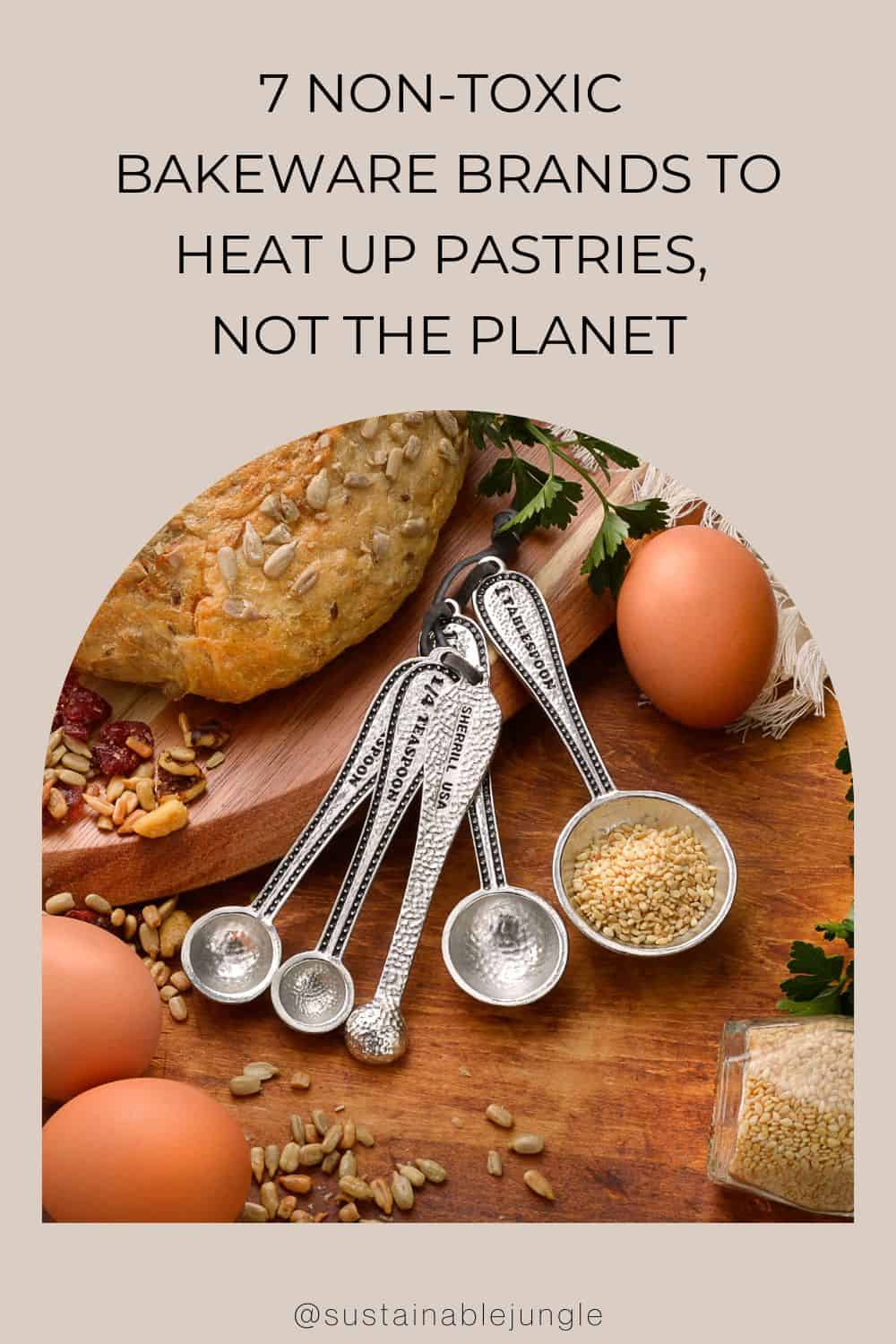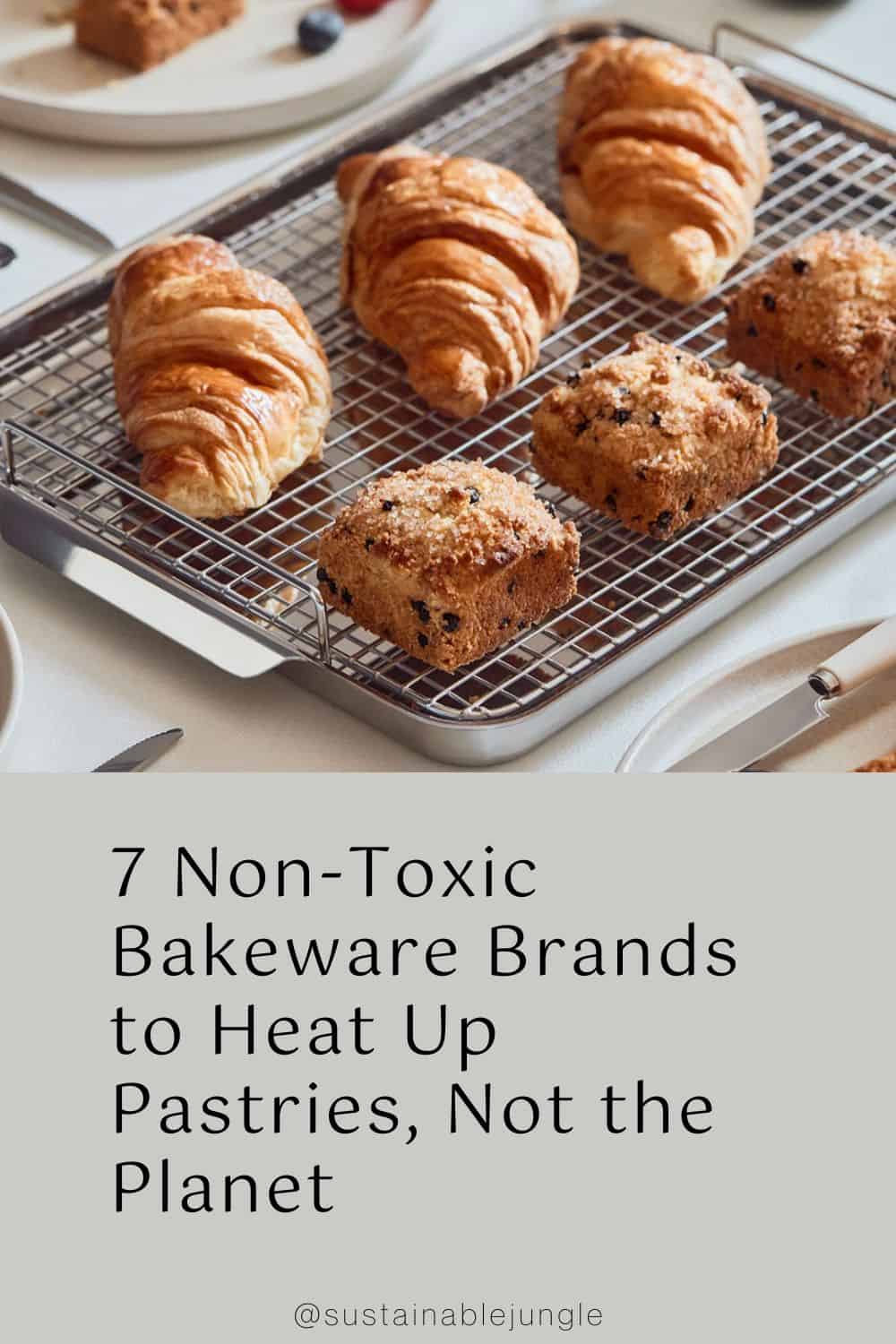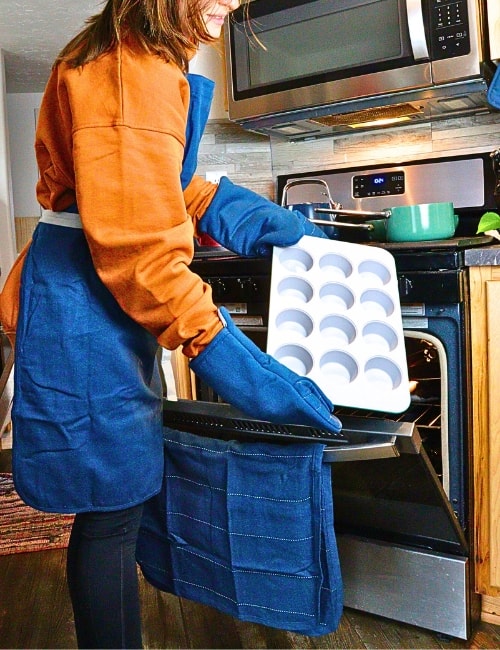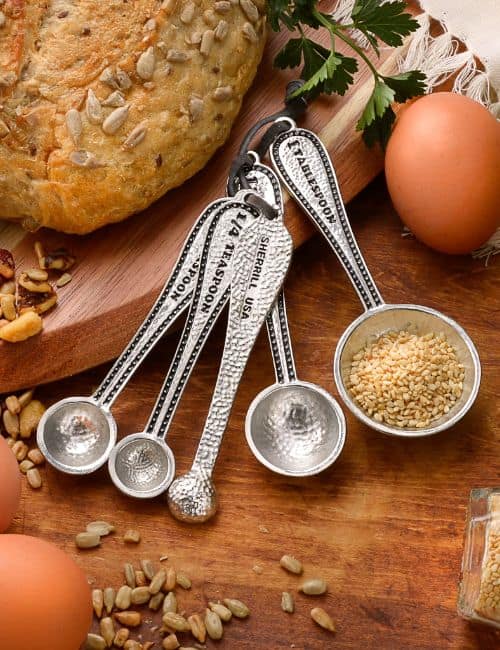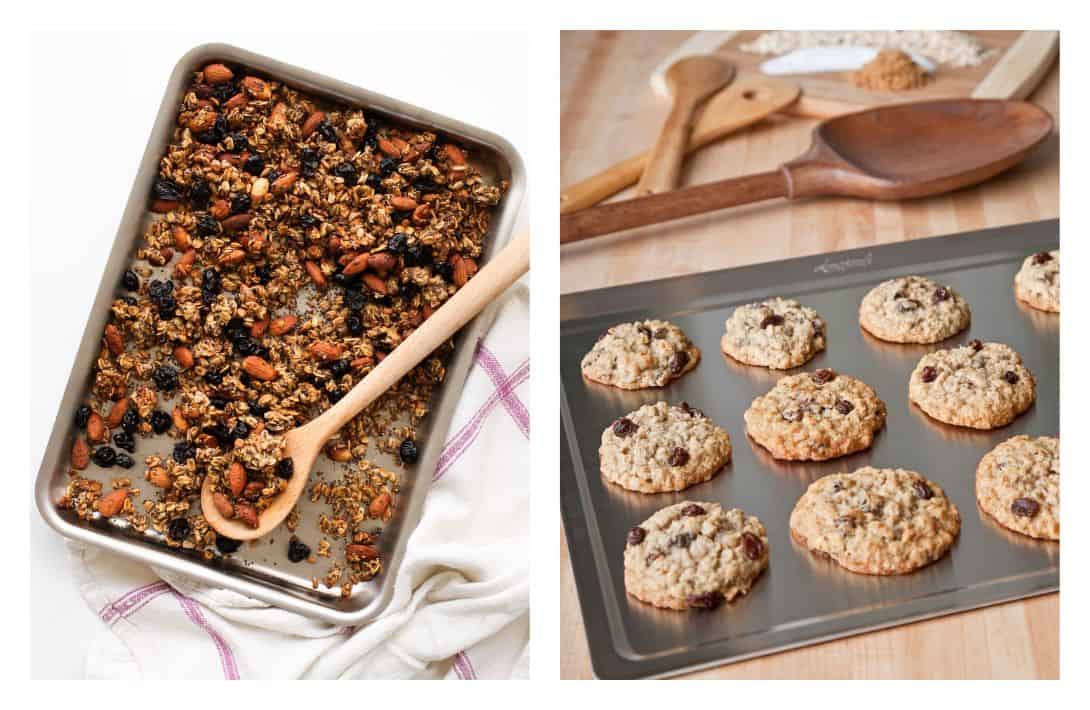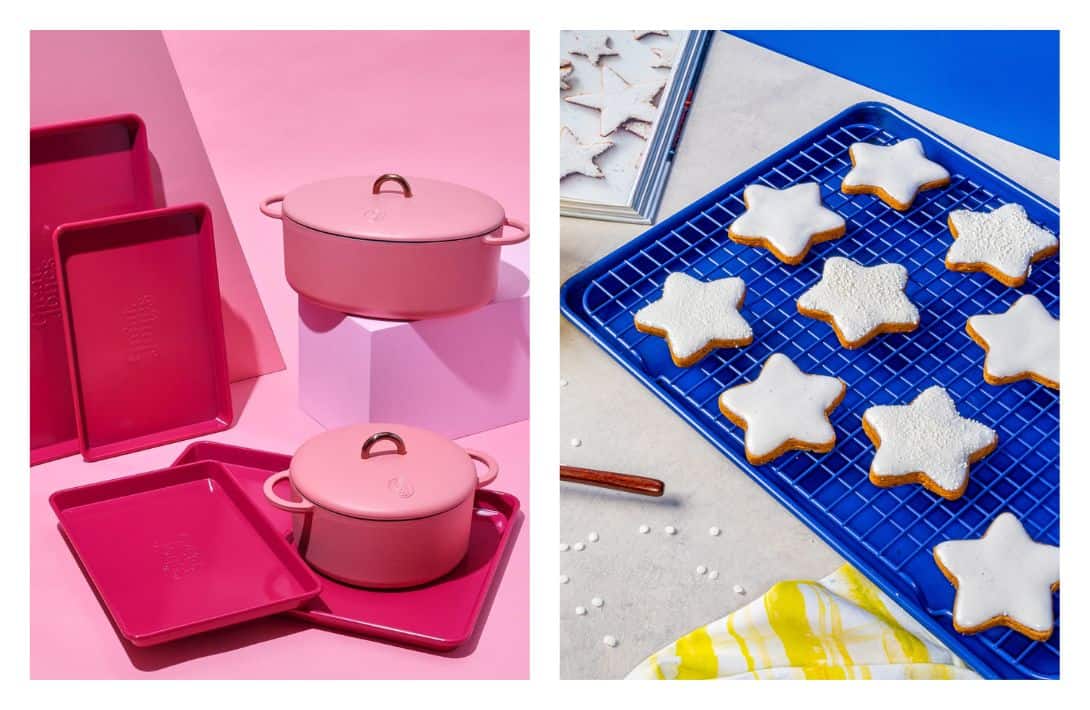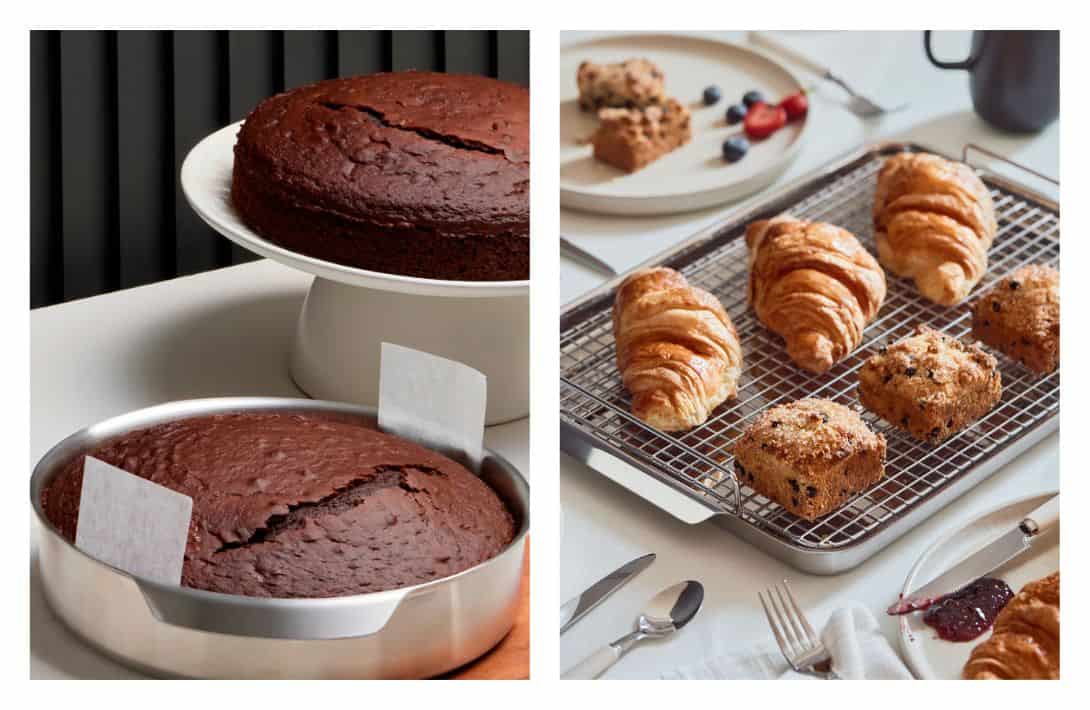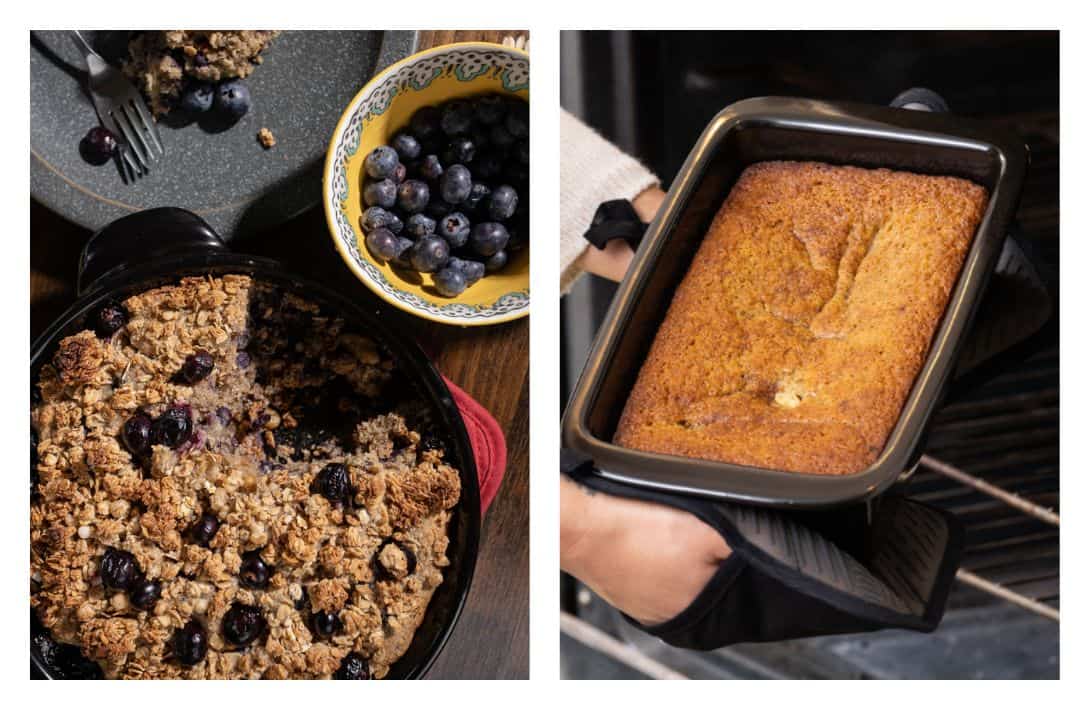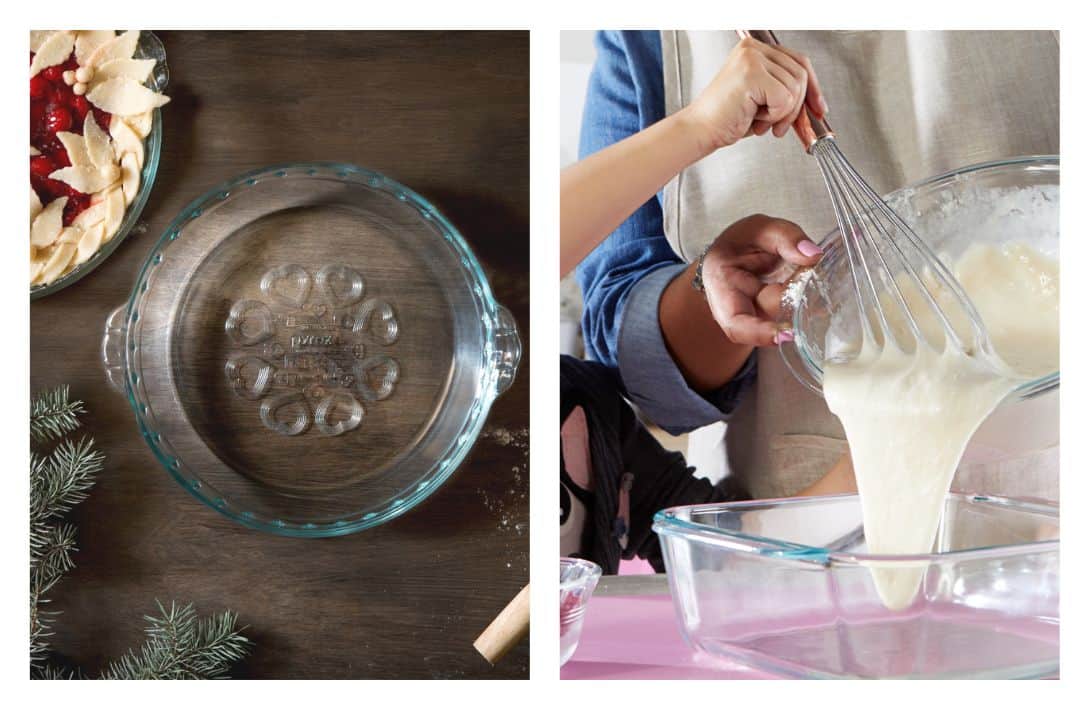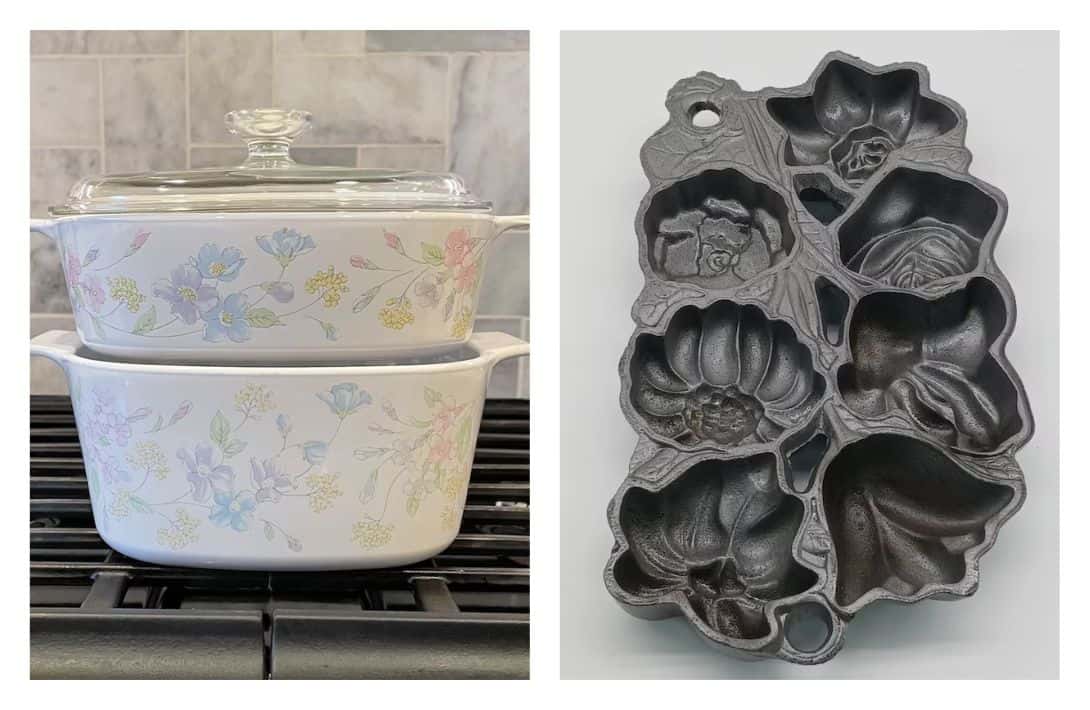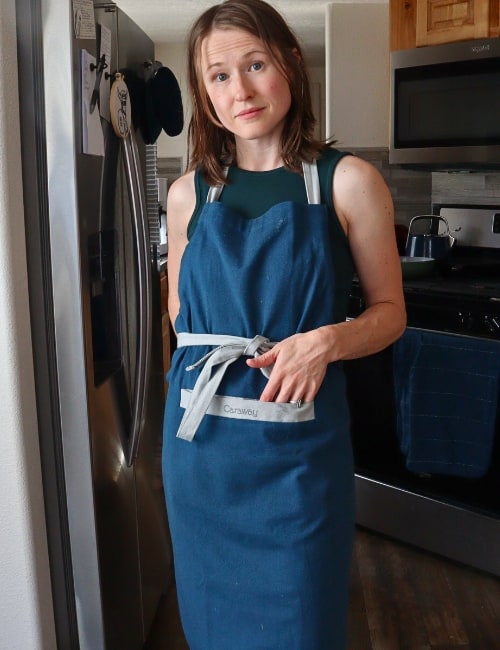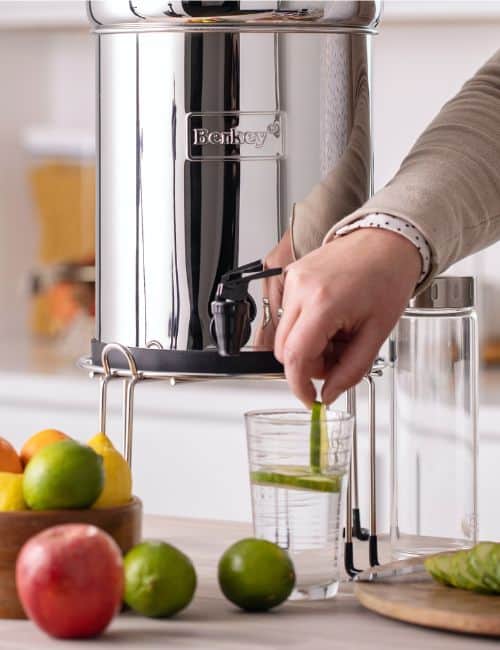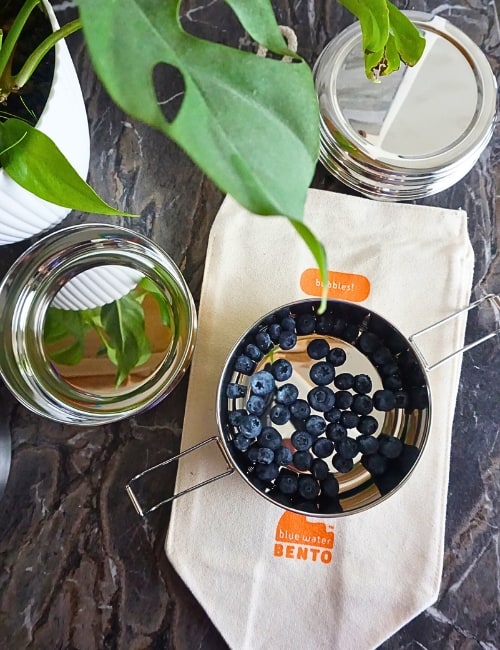7 Non-Toxic Bakeware Brands to Heat Up Pastries, Not the Planet
All bakers know putting baked goods in the fridge makes them go stale faster—but did you know baking them in non-toxic bakeware is even more important?
If eco-friendly cookware is what you’re after, conventional non-stick coatings are a no-no. At high heats, many non-stick coatings weaken and can leach metal and toxic fumes into your food.
We want the smell of cookies wafting from our kitchen, not weird chemicals.
Not to mention that baking acidic foods—like your favorite fruit pastries—wears down the coating and reduces the life of the bakeware.
So if your stainless steel bakeware is warping, stained, rusting, or scratched from all the well-intentioned meals you’ve whipped up, it’s time for an upgrade to a more durable, eco-friendly, and safe bakeware alternative.
Don’t know where to buy non-toxic bakeware?
Get a loaf (pan) of these brands that are filling our kitchens with the kind of non-toxic non-stick bakeware you’ll want (and be able to) to use for years to come.
Everything we recommend to you on Sustainable Jungle is independently researched and we ask all brands to confirm their claims. To avoid waste, we test products on an as needed basis. This post contains affiliate links. If you buy something through our links, we may earn a small commission. Learn more about why we do this here.
The Safest Bakeware For Your Kitchen
Caraway isn’t just one of our favorite non-toxic bakeware brands for their colorful aesthetic. Their ceramic-coated bakeware emits significantly less carbon in production than traditional ones.
You’ll do a little dance in your eco-friendly apron with a full 360 spin once you learn about the extensive range of chemicals not present in 360 Cookware’s equally extensive range for the healthiest bakeware.
Curious about what materials make for the best non-toxic baking sheets or safe non-toxic muffin bakeware?
Whisk your way to the end of the article, where we share how we baked this list to perfection.
The Full List Of Healthy Bakeware Brands
- Caraway | Visit Store
- 360 Cookware | Visit Store
- Great Jones | Visit Store
- Milo | Visit Store
- Xtrema | Visit Store
- Pyrex | Visit Store
- Etsy Vintage Bakeware | Visit Store
1. Caraway
About Caraway
Price Range: $40–$1,830
Caraway wants you to get carried away in a feasting frenzy with some of the safest baking sheets, pans, and more.
If you’re looking for a pop of color with all the benefits of toxin-free cooking, this US brand offers à la carte items or sets of five or eleven pieces for ultimate guest entertaining.
You’ll find the full spectrum of ceramic-coated options including safe, non-toxic muffin bakeware, loaf pans, baking sheets, square and circle pans, as well as cooling racks and a storage container to keep it all neat and tidy.
Caraway’s Ethical & Sustainability Practices
Materials:
Utilizing an aluminized steel body with handles made from stainless steel, Caraway’s bakeware has a non-toxic ceramic coating keeping harmful chemicals (like PFAS, PTFE, and PFOA) from leaching into your delicious dinner.
Pair that with the fact you don’t have to use as much butter (debatably a good thing), so you won’t have to use your eco-friendly sponge to clean as much!
While ceramic coatings are a sturdy option under proper care, its Achilles heel is metal cooking utensils, so steer clear of scraping these to dish up any baked goods.
Supply chain & labor practices:
Caraway bakeware is produced in ethical BSCI and SMETA-certified factories in China.
Their partners uphold fair working conditions, employee benefits, and living wages because while we may slave away in our zero waste kitchen for a beautiful family meal, workers should not.
Carbon commitments & green practices:
Caraway’s ceramic coating emits 60% less CO2 during production compared to other non-stick options.
They also make a point to use eco-friendly packaging materials, incorporate organic cotton in other products (like their Tea Towels), and prioritize low-impact sustainable dyes.
2. 360 Cookware
About 360 Cookware
Price Range: $128–$1,022
When searching for healthy baking pans of any shape or size, you’ll end up doing a 360 and landing right back where you started at 360 Cookware.
Known as the greenest cookware factory in the world, they want you to have the best tools for your kitchen to pass down for generations to come with their lifetime warranty.
360 Cookware covers all your sustainable kitchen needs with a huge range of non-toxic bakeware: sheets, pizza pans, cake pans, pie pans, roast pans, and dozens of cookie cutters for some holiday fun.
360 Cookware’s Ethical & Sustainability Practices
Materials:
Their non-toxic stainless steel bakeware has a heat-conducting aluminum core which allows for food to heat up more quickly at lower temperatures.
Made for oven-safe temperatures up to 500 degrees Fahrenheit, you’ll never find any PFAS, PFOS, PFOA, or PTFEs in 360’s safe bakeware.
Supply chain & labor practices:
Though made in Wisconsin with 20 employees, they can’t completely claim that they sell non-toxic bakeware made in the USA since they outsource a few items from China and South Korea.
Their US factory provides competitive wages, health care, and IRAs, but there isn’t any information about their Asian partners, so we’ll be reaching out about this.
Carbon commitments & green practices:
By creating “heirloom quality” products, 360 Cookware encourages consumers to buy, maintain, and pass down these durable items, which keeps them out of landfill.
Their manufacturing methods are safe and require no EPA permits.
3. Great Jones
About Great Jones
Price Range: $28–$275
Great Jones is where retro designs meet modern function, with colorful bakeware to catch attention across the table.
An all-female-run small business established in New York City, they’re all about making you feel empowered to make the best meals, no matter the size of your kitchen or family.
The gals at Great Jones take sustainability seriously, but you’ll find lighthearted humor sprinkled throughout their products—like their Little Hottie dish or their bold Holy Sheet pan.
Great Jones’s Ethical & Sustainability Practices
Materials:
Their bakeware consists of three types of materials.
The dutch oven pots are enameled cast iron, which makes them dishwasher-safe.
All healthy baking sheets, muffin pans, cake pans, and non-toxic loaf pans are made from aluminized steel.
Their selection of pie and casserole baking dishes are in standard ceramic.
All three are lead, cadmium, and PFOA-free, but the nonstick coating on the aluminum bakeware does contain some PTFE or PFOs, so we recommend sticking with the cast iron or ceramic options.
Supply chain & labor practices:
Great Jones gets its beautiful pieces manufactured by partners based in Guangdong, and Tianjin, China as well as in the USA.
Beyond this information, there aren’t any details on their supply chain, so we’ll reach out for more insight into their labor practices and work environments.
Carbon commitments & green practices:
Most modern pots and pans cannot be recycled due to the toxic coating, so unless they’re in semi-decent condition to donate, they just end up in a landfill.
Great Jones saw an eco-opportunity and created a recycling and donation aspect to their business model in partnership with Hot Bread Kitchen in New York.
Alongside this, they offer a lifetime warranty for select items.
Community & charitable giving:
Great Jones collaborates with and supports The Coy Collection, a black, female-owned ceramic business in Austin, TX.
4. Kana
About Kana
Price Range: $105–$375
Kana’s range of Milo bakeware is classically timeless, elegant, and of course, non-toxic.
Their design is thoughtfully ergonomic (with handles for grip) and versatile, whether used as grillware, bakeware, or serve ware.
While their collection only consists of cake pans in various sizes and stainless steel baking sheets, the quality is well worth investing in their Bakeware Starter Bundle, created for beginner or advanced bakers alike.
Kana’s Ethical & Sustainability Practices
Materials:
Their TOMATEC™ enameled cast iron dutch oven pots come in 3.3L or 5.5L sizes and are usable on both the stovetop and in the oven up to 500°F.
Free from PFOAs and PTFEs, choose from 9 colors to match their cookware.
Milo’s main bakeware is tri-ply clad stainless steel with an aluminum core that tolerates heat up to 1000°F. If you’re after a REACH-certified, durable product that will evenly bake your famous three-tiered cake, Milo will make it happen.
All materials are certified non-toxic, verified by additional OEKO-TEX certification.
Supply chain & labor practices:
Milo bakeware is manufactured in BSCI and OSI-compliant, family-owned factories.
They take workers’ health and safety as well as environmental impact seriously with
ISO 9001, 4001, and 45001 certifications.
While the certifications are a step in the right direction, we’d love even more transparency about what specific factories they work with and where in the world they are located.
Carbon commitments & green practices:
Milo goes the extra mile and offsets 100% of its shipping-related carbon emissions.
We’d love to see them whip up a sustainability report for what other areas they reduce their carbon impact during production.
Community & charitable giving:
Kana is a member of 1% for the Planet and plants trees for every purchase to help reforestation efforts.
5. Xtrema
About Xtrema
Price Range: $40–$210
Xtrema takes baking to the X-tremes with their ceramic non-toxic bakeware, which is triple-fired and purified at 2,500°F.
Nearly 40% lighter than traditional cast iron, this brand knows how to cater to bakers looking for quality dishwasher-safe bakeware without the physically taxing and (environmental) weight.
While donning the standard non-toxic loaf pan, pie pan, muffin pan, and baking pans, you can give their Grill Pan a go for those perfect lines across a plant-based burger.
Xtrema’s Ethical & Sustainability Practices
Materials:
Using 100% all-natural, pure ceramic is one of the best non-toxic bakeware materials in the cooking world.
With optimal heat retention, you can use your pure ceramic bakeware in the microwave, oven, BBQ, or freezer, and you never have to worry about damage in the dishwasher as it is scratch and chip resistant.
All items are certified PFOA and PTFE-free with no coatings, synthetic glues, polymers, lead, or cadmium that can leach into your meals.
California Prop 65 ensures that these are some of the best non-toxic baking pans out there as they test for the presence of over 800 toxic chemicals.
Supply chain & labor practices:
“Creating synergy between mindful cooking, healthy lifestyles, people & the environment” is what Xtrema aims to provide by using skilled artisans from China, where the art of ceramic design is well over 10,000 years old.
While family-owned and operated in the US, we have reached out to get more information about their supply chain in China but haven’t heard back yet.
Carbon commitments & green practices:
Xtrema demonstrates a passion for sustainability and claims to minimize waste in its manufacturing processes, but there are no specific details available on its carbon sequestering or reducing initiatives.
We’d love to see this brand lift the lid to give a taste of its green business practices.
Community & charitable giving:
This healthy bakeware brand is a partner of Goodwill, which aims to help people find employment through their fulfillment centers.
Xtrema is looking for more ways to give back to the community and is always open to suggestions.
6. Pyrex
About Pyrex
Price Range: $9–$50
Pyrex is a well-known household name and has been producing some of the safest baking pans and bowls since 1915.
The main difference from competitors?
They work with a specialized Borosilicate glass that absorbs heat waves as opposed to reflecting them. This ultimately allows for a faster cook time and thus conserves energy.
Fun fact: it was originally designed for railroad lantern glass to be thermal shock resistant.
Made in Pennsylvania, their parent company, Corning, manufactures all Pyrex® Essentials and Easy Grab® glass bakeware—like the Pyrex®Easy Grab 1.9L Covered Casserole.
Pyrex’s Ethical & Sustainability Practices
Materials:
Ever notice after years of baking delicious home-cooked meals, your stainless steel bakeware and stainless steel baking sheets begin to get discolored or rusted?
With glass bakeware, you can toss that problem into the flames of the past.
There’s nothing quite so frustrating as fighting to get that overcooked bit of banana bread off the loaf pan without damaging it, but Pyrex glass makes it a non-stick bakeware that promotes even heat distribution.
All glass is sand-based, but Borosilicate glass is made by repeatedly heating raw silica sand and boric oxide to extreme temperatures, yielding a product that can withstand high heat and impact.
Pyrex also offers newer cast iron, stainless steel, aluminum, and ceramic bakeware. The most popular is a heavy gauge metal range that has a non-stick coating that is silicone based, but we’re unsure if it may leach harmful chemicals.
Your safest bet is to go with the naturally non-stick, oven-safe, and dishwasher-safe glass bakeware.
Supply chain & labor practices:
Because Pyrex is owned and produced by Corning Inc., we utilized their supply chain information.
Their factory takes social and environmental responsibility seriously. They run supplier audits by both Corning employees and third-party auditors to ensure they follow their Code of Conduct.
All suppliers and factories must be RBA-compliant.
Known by Forbes as one of the world’s best employers, they reached 100% gender pay equality across their entire global network.
They also scored 90% for the Human Rights Campaign Foundation’s 2021 Corporate Equality Index.
Carbon commitments & green practices:
Corning has an extensive and in-depth analysis of the sustainability measures and goals in their Sustainability Report. They work with solar energy plants, waste management, and water recycling initiatives to make their factories efficient and environmentally friendly.
Currently, they use power purchase agreements as opposed to carbon offsets. Corning is working towards meeting measures in the Paris Climate Agreement, like 100% renewable energy in the United States, Canada, and Europe.
Because glass and ceramic require extensive amounts of heat and water, they’re actively working with their engineers to discover lower-carbon ways to produce their products to meet their net-zero carbon targets.
Community & charitable giving:
Corning has pledged 5.5 million dollars to North Carolina Agricultural and Technical State University, the largest historically Black university. This money will help students advance in STEM education and careers.
7. Etsy Vintage Bakeware
About Etsy Vintage Bakeware
Price Range: Varies
Etsy is a wonderland for used and vintage wares, making you work up an appetite with their bakeware selections.
It’s also an ethical and more community-driven alternative to Amazon.
Whether you’re looking for non-toxic bakeware sets or looking to score some of the best non-toxic ceramic baking sheets with a retro flare, if you can imagine it, Etsy likely has it.
With so many options available, we’ll give you a little taste test with Nwfunfinds, a specialty vintage, Oregon-based seller providing mainly Corning ceramic and Pyrex glass bakeware.
The amber and blue Pyrex casserole dishes are some of the best non-toxic bakeware with lids, perfect for keeping a meal hot from the oven to the table. There are also sets of glass cups and other decorative homewares.
Etsy’s Ethical & Sustainability Practices
Materials:
With this seller, you’ll find primarily ceramic bakeware and Pyrex glass bakeware, but there is the odd stainless steel bakeware as well as aluminum baking sheets.
Glass and ceramic items are always oven-safe and dishwasher-safe, so there’s no need to stress about their durability or toxicity.
While discovering the unique bakeware of Etsy, you’ll want to be careful and discerning of materials, as legal requirements were once even more lax than they are today. Avoid anything made of vintage metal or with enameled coatings, as there can be toxic chemicals and heavy metals that can leach into your baked goods.
Supply chain & labor practices:
With Etsy, there’s a real person (sometimes just one) behind every shop, and in the case of collectors of vintage bakeware, they simply do it for the love and enjoyment of ensuring these timeless pieces find a second life and home.
Carbon commitments & green practices:
By shopping at nwfunfinds (and Etsy as a whole), secondhand items stay out of landfill, thus putting less strain on our natural resources and limiting unnecessary heat and water usage to create more glass and ceramic products!
Etsy also offsets 100% of its shipping emissions and operates on renewable energy.
Did you know we Have a Newsletter?
We cover the latest in sustainable living, fashion, zero waste, beauty, travel, finance and more…
Why Choose Safe Baking Pans?
Eating is a lifelong endeavor (as is figuring out what’s for dinner every night), so if we’re going to be doing it for 100 years, we need to invest in our health, which starts with what we cook food in.
When it comes to the best baking sheets, non-toxic is non-negotiable.
So we have to start with the burning question on every baker’s mind: is non-stick bakeware toxic?
From non-tick bakeware to granite stone cookware, it’s a slippery slope (or pan) figuring out whether modern bakeware is toxic. Teflon changed its coating in 2013 to eliminate PFOAs due to serious health implications, but there are other non-stick coatings like those made of a silicone base or containing PTFEs.
This video by the Environmental Working Group (EWG) explains the dangers of PFAS, as well as numerous studies linking them to cancer and other health problems due to the fact that they stay in the environment and human body for a long time after exposure.
So how do companies make non-stick coatings and bakeware now?
Typically, modern bakeware and cookware products use a category of “GenX” perfluorochemicals, including PTFE and PFOS.
While supposedly “healthy” alternatives, the EPA conducted a study determining its toxicity at near equal measure.
Pair this with the fact that if your aluminum or stainless steel loaf pan has a non-stick coating on it, it can’t be recycled. Buying bakeware that’s pure ceramic or glass avoids excess waste going into landfills.
Because of the toxic nature of non-stick coating leaching into every meal (even if it’s oven-safe), our usual “use what you have until it’s time to replace it” philosophy doesn’t apply here.
Bin the toxic bakeware—or better yet, treat it like old Tupperware and come up with a clever (non-food-related) way to upcycled it. Planters for your apartment garden, perhaps?
Opt for a non-toxic bakeware cake pan or search for safe baking sheets that won’t flake off nanoparticles when it gets scratched—allowing aluminum iron, cadmium, and more heavy metals to find their way into your system.
Always ensure you’re following the recommended temperatures that your bakeware can tolerate because regardless of how healthy we want to be, your non-toxic baking pans can still emit smoke which is equally unsavory.
What Is The Most Non-Toxic Bakeware?
Now you know about chemicals to avoid, what is the best non-toxic bakeware material?
Pure ceramic bakeware is made of renewable and natural resources such as clay and sand, but it does take a lot of heat and water to create. It’s typically free of toxins, but just ensure its non-stick coatings are up to your eco-friendly standards.
One of the best materials for bakeware, cast iron has been used for centuries and for good reason: it is insanely durable. By maintaining it with regular seasoning, it can easily be passed down to other family members and reduce resource usage.
Cast iron also has commendable heat retention and even heat distribution, keeping your food warm long after the oven or stove has worked its magic.
Glass bakeware is naturally non-toxic and is oven safe, dishwasher-safe, and can be utilized in the microwave or to store food in the fridge or freezer.
Just don’t confuse glass bakeware (AKA heat-resistant Borosilicate glass) with regular glass at end-of-life disposal. Borosilicate glass cannot be recycled alongside regular glass and at this time, no specialized services exist to recycle it.
So take care of your glass loaf pan and pie dish to ensure they last a lifetime.
Porcelain Enamel is created by mixing ceramic porcelain with a metal like aluminum, steel, or iron. Because of its nonporous nature, it is naturally non-stick, but unfortunately, this doesn’t stop companies from often adding their own toxic coatings.
Some downsides are that they don’t do well at high heat for long periods and they are prone to cracks.
Is aluminum bakeware non-toxic?
Aluminum may fall among oven safe materials, but it’s one to be on the lookout for, since scratches can leak toxic metals into food.
Because aluminum itself is toxic, it must be coated in something—and those coatings are usually equally toxic.
While a lightweight material (making it ideal for large servings), it’s not as durable and can give off unwanted flavors.
Is carbon steel bakeware non-toxic?
Carbon steel is made of carbon and iron, and it does not emit any kind of toxic chemicals at high heat.
It is responsive to heat variations so is easy to control, but it is prone to corrosion compared to other metals.
Is stainless steel bakeware non-toxic?
Stainless steel is dent and scratch resistant, as well as anti-corrosive and rust-resistant (but not completely immune to it).
Its main downfall is exposure to acidic foods, which can lead to metal leaching. It’s also known for having a decently low thermal heat conductivity.
Is silicone bakeware less toxic than non-stick?
There hasn’t been enough research into silicone bakeware food safety.
It’s a synthetic rubber commonly used for muffin pans that is oven safe up to 428F, freezer safe, and said not to leach into food.
But there is debate over its leaching at high heat. If blended with anything else, it has poor oven performance (meaning you must look for food-grade pure silicone). It can also develop a sticky texture if not washed and stored properly.
While silicone is not plastic, it’s not widely recyclable, either.
Your next question may be “is silicone biodegradable?” to which we would answer, no. While silicone bakeware is a good alternative if you’re sensitive to metals, maybe wait until there’s more research on it.
How We Found The Best Non-Toxic Bakeware Sets
If you’re considering doing a full eco-overhaul of your home, let it start with the best non-toxic cookware followed by eco-friendly cleaning products, and finish off with some sustainable furniture brands.
To build an Earth-conscious home, we have to be thorough.
While we may have thought a ceramic spaghetti bowl on our heads as children was fashionable, it also happens to be sustainable (the ceramic, not the fashion sense).
Materials:
The aforementioned bakeware materials are the most commonly found to be used in baking, but if they come with a toxic coating, it defeats the purpose of their sustainability.
Always look for labeling that states the coating is free of lead, cadmium, PFAs, PTFEs, and other heavy metals or toxins.
- Certifications: OEKO-TEX, Registration, Evaluation, Authorisation and Restriction of Chemicals (REACH)
Supply chain and labor practices:
Ever wonder what the mysterious natural flavor is that’s stated on so many packaged ingredient lists?
Just as we don’t appreciate the secrecy in our food, we also don’t like behind-the-scenes exploitation of workers. Supply chains should be transparent, but it’s a slow and arduous road (like watching boiling water).
Some brands are recognizing the demand for knowledge from consumers and are implementing certification practices that ensure fair wages and safe working conditions.
While certifications like B Corp are sometimes under contention about their efficacy, you should always look for multiple certifications in other areas of the company to understand the scope of their attitude towards human and environmental safety.
- Certifications: Business Social Compliance Initiative (BSCI), Sedex Members Ethical Trade Audit (SMETA), International Organization for Standardization (ISO 9001, ISO 14001, ISO 45001), Responsible Business Alliance (RBA), Open Systems Interconnection (OSI)
Green business practices:
While some businesses stick with just carbon offset programs, many are realizing it’s not enough anymore. That’s why you’ll see many of these brands working up the courage to actually tackle manufacturing emissions at the source.
For that loaf pan to be low-impact, it needs to be made with durability, functionality, and non-toxic materials in mind.
Being dishwasher-safe helps ensure folks won’t accidentally ruin their new goods.
A large portion of people buy bakeware online, so things like conscious packaging materials go a long way, as well as reducing energy usage during production and manufacturing processes.
Community & charitable giving:
It always warms our hearts to see brands stepping up to the plate and getting involved in their communities.
From donating returned bakeware to simply offering text message recipes to use with the products, the community is at the center of a good meal.
Final Thoughts On Non-Toxic & Safe Bakeware
Choosing the best bakeware material doesn’t have to be a science (but baking does).
By educating yourself on what to look for (i.e. toxic coatings), you’ll be well on your way to hosting the next Thanksgiving dinner with a full range of eco-friendly dinnerware and bakeware from one of these sustainable brands.
We are lucky enough to live in the age of opportunities and choices, so be sure to choose with health and the planet in mind so future generations can enjoy a beautifully seasoned cast iron heirloom pot.
Even if you don’t fancy yourself a modern Betty Crocker, a more non-toxic and conscious lifestyle can benefit everyone, so share this article with friends and family.
Pin these:
